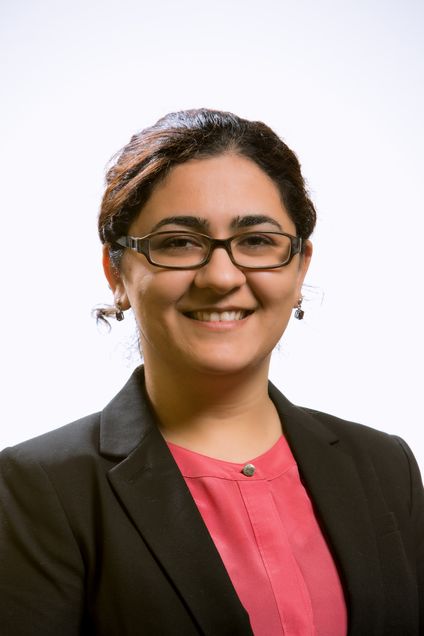ENG Researcher Touted As Emerging Leader
By Liz Sheeley

Assistant Professor Sahar Sharifzadeh (ECE, MSE, Physics) was recognized by Nature as one of 11 early- to mid-career scientists making an impact in their fields. These leaders were chosen from among 500 scientists and evaluated based on publishing and citation rate and quality, industry links, and co-authorship networks from Nature Index and the League of Scholars Whole-of-Web (WoW).
“It’s an honor to be recognized in this way,” says Sharifzadeh. “What we can do in the field of computational materials science has grown significantly in the past few years and I’m excited to be a part of it.”
Sharifzadeh’s research aims to understand how materials respond electronically to light. Through computational models and analysis, she can detail the atomic-scale properties and define characteristics of materials.
“Not all materials behave in the same way when exposed to light energy,” says Sharifzadeh. “We look at how a single electron is excited by light absorption and predict its movement once it is excited, which is how energy is extracted from light. Those data can tell us why a particular material would be good or not good for a specific device such as solar panels.”
As an electrical engineering and computer science major at the University of California Berkeley, Sharifzadeh became interested in how electronic devices work and why. This led her to transition to study solid-state physics during her doctoral program at Princeton University, and her research interests evolved from the drive to understand how the materials that allow electronics to work on a deeper level. In 2014, she joined Boston University and in 2017, she was awarded the U.S. Department of Energy Early Career Research Award.
-
BU Today asked Sharifzadeh about how she became interested in physics, her research focus, and being a researcher and the parent of a young child. The BU Today interview was published on 9/28/18.
BU Today: Can you explain briefly how you first became interested in physics? Was it as a child?
Sharifzadeh: I did become interested in physics as a child. From a very young age, I liked to read my older sister’s science books and at around age eight decided I would be a physicist (although I did not really understand what that meant). Through school, I continued to read and be interested in the physical sciences, focusing first on astronomy, then electromagnetics, then finally electrical engineering when I went to university.Can you tell us about your arrival in Boston and BU and what you wanted to focus your research on, and why?
I came to BU in fall 2014 as an assistant professor. I was hired through the ENG materials science program, where the focus of faculty search was digital design of materials. When I came to BU, my goal was to be able to understand how certain classes of materials (excitonic materials) interact with light and to use that understanding to design new materials. I think the physics of excitonic materials is very interesting and there are still many open questions. Also, there are a variety of applications in optoelectronics, such as solar cells and sensors, and even the area of quantum computing.
In addition to being a scientist, you have a year-old daughter. How do you manage to juggle your research and your homelife? What are the keys?
I think homelife and research are very difficult to balance for anyone, with or without kids, because of the nature of research, but with a young child, it is much harder because they need their parents so much. I think I have been lucky to have dependable childcare, where I feel that my baby is well taken care of when I am at work. Additionally, having a supportive partner who takes an equal role in childcare is key in my opinion. Sometimes it is necessary for me to take weekends to work or travel to conferences, and my husband takes on more responsibility at those times to allow me to do that, even though he also has a demanding job. Flexible parental leave policies, for both parents, are also invaluable.
What advice would you give to a young physicist today?
I think that to be successful as a researcher, it is necessary to be creative as well as a good student. By that I mean one should be knowledgeable, but think creatively about how to address challenging questions. I would suggest to young people to explore creative ways of solving physics or engineering problems and build that confidence and vision that will allow them to be good researchers.